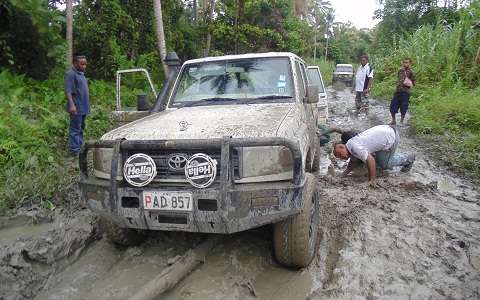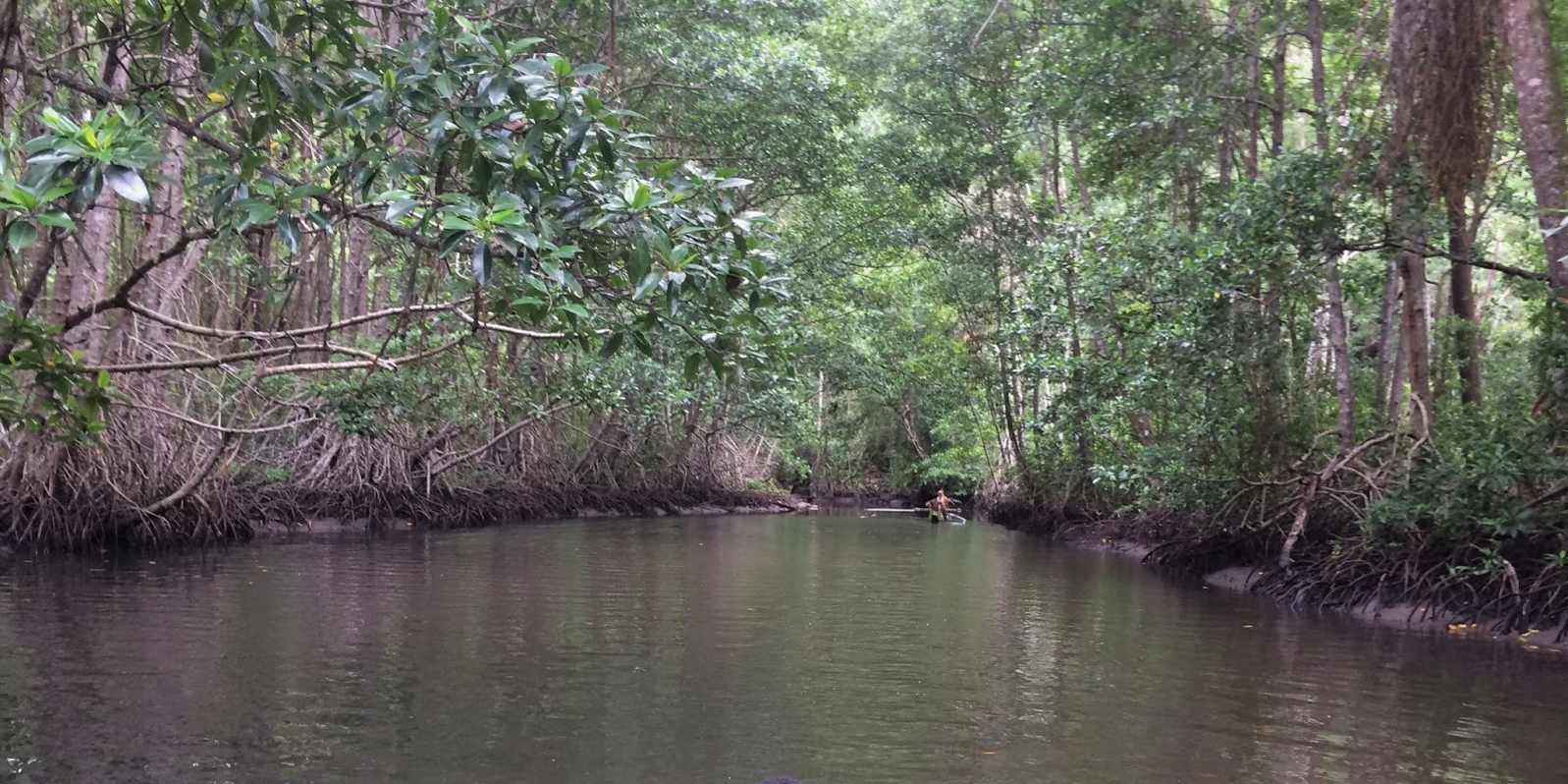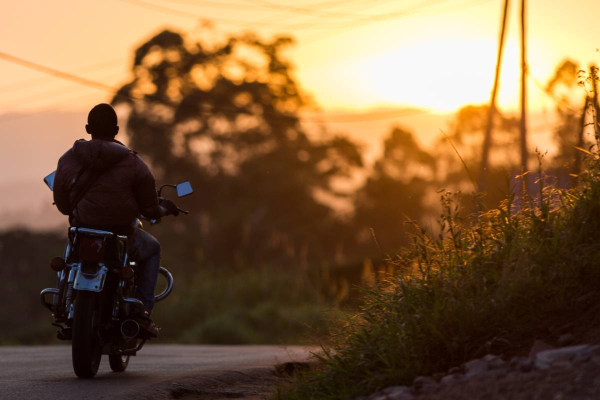Leaning Into the God They Knew
How communities in Papua New Guinea are embracing Scripture

“Tell me the story of your walk with God as a community.”
That’s essentially what Michele Axelson asks when she visits communities in Papua New Guinea. As the senior field coordinator for the Pacific, she often has the opportunity to meet with people from different language groups and learn about how Scripture has impacted their community.
Michele lived in Papua New Guinea for 12 years, so when we sat down together to talk about her experience, there was a familiarity and excitement as she described the grey mud roads, thatched roofs of “haus wins” (open-air houses on stilts) and beautiful, open water of the islands. In addition to her role as a Wycliffe field coordinator, Michele also serves as a partnership facilitator for the Pacific area. Basically, she connects with other organizations serving in the area like SIL, Youth With A Mission (YWAM) and more.
On a recent trip to Papua New Guinea, Michele was awed by the ways that God demonstrated his presence and power to the people through both joy and sorrow.
A TRUCK AND A CHICKEN
Michele’s journey began with a broken-down truck.

On the way to a Mekeo village, the truck she was riding in got stuck in the mud about a half-hour away from the village entrance. The team she was traveling with hopped out of the truck and began the walk to the village where they were greeted warmly with flower leis.
And then Michele was gifted a rope of betel nut with a chicken tied upside-down to it. She graciously accepted the gift, and discovered later that it held significance — this symbolizes that the village chiefs have agreed to partner with the recipient. The small gesture was significant and marked how the Mekeo community has received God’s Word warmly.
The Mekeo were actually introduced to Scripture about 100 years ago. Catholic missionaries had come to the region, and a priest had translated some Scripture into the Mekeo language. While the Mekeo had portions of God’s Word in their language, they hungered for more. They now have the New Testament and Michele has been able to see how the Mekeo are interacting with and being transformed by Scripture. The Mekeo New Testament is being used in churches across denominations as well as schools. One of the village chiefs is part of the Bible translation team.
All of the village chiefs are now believers, which is important because they’re using what they learn in Scripture to steward their resources in order to bring peace and prosperity to their community. The village chiefs sitting together is hugely significant in and of itself — prior to God’s Word arriving in the community, poisoning was commonplace. Therefore, it was always a risk to sit next to someone and share food. Now, chiefs readily sit next to one another in fellowship and share food, knowing that they’re bonded together by their faith in Christ.
As for the broken-down truck? The whole community rallied together in order to fix it.
GRIEF UPON GRIEF, SORROW UPON SORROW
The second leg of Michele’s journey to Papua New Guinea was a firsthand realization in just how deeply God’s Word has changed the Baruga community. “Stuff that happened while there showed me that the Word is in them,” she affirmed.
Even though the area that Michele was visiting was Baruga-speaking, people from the Korafe community were also visiting the village. The goal was to see if the Baruga and Korafe could work together — alongside two other languages closely related to each of them — on an Old Testament translation project, since both the Baruga and Korafe have the New Testament in their languages.
The village where they met was so remote that it takes a four-and-a-half-hour boat ride to get there. And that’s only if you have a boat with a motor. When the team arrived, Michele learned that a number of the people who were supposed to be there from the Baruga villages had been delayed. The villagers were searching for two men who had gone missing in a canoe at a place where one of the rivers meets the ocean.
They never found them.

The following day, Michele met with the translation teams and other community and church leaders working in the village. The village was arranged with houses forming a circle around a grassy area considered to be like the “town square,” where announcements were made to the village. On that day, the translation team was close to wrapping up their time together, sitting in an open building that looked out on the village. Suddenly, a young woman began wailing and ran out of the village. Soon people began to gather and Michele learned the story of what happened.
At a nearby village where the river met the ocean, a woman was washing dishes after a meal. When she reached her arm backward into the river, it was snatched by a crocodile and she perished. She was a mother of six.
The person who had run from the village, Michele learned later, was this woman’s oldest daughter who lived in the village where the translation work was happening, having married into one of the families there. The 19-year-old daughter was understandably distraught, and both she and the family members who lived in the village wailed and cried.
In light of the tragedy, Michele assumed the translation team would want to halt their work — they could easily resume again the following day. But it touched her to hear that the local minister, Father Benedict, saw value in continuing the translation work.
Just before dawn the next day, Michele awoke to the sound of raw, loud wails coming from the house next door and a few of the houses across the grass circle — family members of the woman who died. But then, very slowly, she began to hear the soft sound of hymns rising. Even though Michele couldn’t tell what all of the hymns were, the comforting sound began to rise.
Wailing and singing, wailing and singing.
And then the wailing began to temper down.
In the middle of that misty morning, the dawn finally broke and the wailing subsided. “It was the picture of the light coming and overcoming the darkness,” Michele said.
Later that evening, Michele heard a voice shouting from the same grassy circle: “Grief upon grief, sorrow upon sorrow.” But then: “This is when we gather together and worship our God. We need to do this tonight. We need to come together.” It was a call to worship out of the depth of a genuine sorrow, and the community gathered together and worshipped for a few hours.
Michele recalls how powerfully this experience resonated with her, and how awed she was by the community who experienced tragedy and yet sought God in the midst of it all. It made her purpose in Papua New Guinea all that more impactful and the work that she was participating in all the more real.
“You look for those ways that this is really a community that knows the Lord and is worshipping in their language,” Michele said. “Of course they want the Old Testament. Think about the story of Daniel and Shadrach, Meshach and Abednego, think about Joseph and all of those things that we can draw out of the Old Testament. Of course they want those. And we want them to have them.”
In the midst of it all, Michele counts it a privilege to be able to come “alongside and [be] a part of what God is doing [in Papua New Guinea] amidst this bare reality of hard things and beautiful things.”
Lift up communities in Papua New Guinea and around the world as they navigate both hardship and hope through Scripture in their language.






